-
 Le Hazard du coin du feu, dialogue moral [The Opportunities of the Fireside, a moral dialogue], Crébillon fils (a la Haye, 1763, first edition) 6.25" X 3.75", 260pp, full leather, 5 raised bands and gilt titles on spine and decorating pastedowns, gilt edges, good+ condition, minor bumping to corners, armorial bookplate of Francis John Hughes in front pastedown, Mr. Hughes wrote inside "from the collection of Wallace Stevens. Bought at auction this day 10 March 1959 - FJH" The entire book is a dialogue takes place at Célie's house in a small secluded boudoir and the subject is the deceptions and tricks of debauchery, described through stories, dialogues, and tales by the participants. Claude Prosper Jolyot de Crébillon (1707 – 1777), was a French novelist. He was called "Crébillon fils" to distinguish him from his father, a famous tragedian, Prosper Jolyot de Crébillon. He received a Jesuit education at the elite Lycée Louis-le-Grand. Early on he composed various light works, including plays for the Italian Theatre in Paris, and published a short tale called Le Sylphe in 1730. From 1729 to 1739 he participated in a series of dinners called "Le Caveau" (named after the cabaret where they were held) with other artists, including Alexis Piron, Charles Collé, and Charles Duclos. The publication of Tanzaï et Néadarné, histoire japonaise (1734), which contained thinly veiled attacks on the Papal bull Unigenitus, the cardinal de Rohan and others, landed him briefly in the prison at Vincennes. Publication of Le Sopha, conte moral, an erotic political satire, in 1742 forced him into exile from Paris for several months. Wallace Stevens (1879-1955) was an American modernist poet. He won the Pulitzer Prize for Poetry for his Collected Poems in 1955.
Le Hazard du coin du feu, dialogue moral [The Opportunities of the Fireside, a moral dialogue], Crébillon fils (a la Haye, 1763, first edition) 6.25" X 3.75", 260pp, full leather, 5 raised bands and gilt titles on spine and decorating pastedowns, gilt edges, good+ condition, minor bumping to corners, armorial bookplate of Francis John Hughes in front pastedown, Mr. Hughes wrote inside "from the collection of Wallace Stevens. Bought at auction this day 10 March 1959 - FJH" The entire book is a dialogue takes place at Célie's house in a small secluded boudoir and the subject is the deceptions and tricks of debauchery, described through stories, dialogues, and tales by the participants. Claude Prosper Jolyot de Crébillon (1707 – 1777), was a French novelist. He was called "Crébillon fils" to distinguish him from his father, a famous tragedian, Prosper Jolyot de Crébillon. He received a Jesuit education at the elite Lycée Louis-le-Grand. Early on he composed various light works, including plays for the Italian Theatre in Paris, and published a short tale called Le Sylphe in 1730. From 1729 to 1739 he participated in a series of dinners called "Le Caveau" (named after the cabaret where they were held) with other artists, including Alexis Piron, Charles Collé, and Charles Duclos. The publication of Tanzaï et Néadarné, histoire japonaise (1734), which contained thinly veiled attacks on the Papal bull Unigenitus, the cardinal de Rohan and others, landed him briefly in the prison at Vincennes. Publication of Le Sopha, conte moral, an erotic political satire, in 1742 forced him into exile from Paris for several months. Wallace Stevens (1879-1955) was an American modernist poet. He won the Pulitzer Prize for Poetry for his Collected Poems in 1955. -
 The Lysistrata of Aristophanes | Wholly translated into English and illustrated with eight full-page drawings by Aubrey Beardsley with a preface on Aristophanic Comedy and its reflection in the art of the Illustrator by George Frederic Lees, Aristophanes, illus. by Aubrey Beardsley, forward by George Frederic Lees (Privately Printed in Paris, 1931, #352/525) 11.25" X 9.25", 61pp, loosely bound with loose cover, with original slip-case, printed on hand-made Van Gelder paper, 8 illustrations printed on mould-made Annoy Paper, interior pages clean and in fine condition, slip-case is in poor condition, some soiling on the cover. Aristophanes was the greatest writer of ancient Athenian “old comedy,” known for its satires of contemporary life and for its broad, often obscene humor. Lysistrata was first produced in 411 BC, when the Peloponnesian War had been devastating Greece for 20 years. Most people know the plot: Lysistrata assembles women from all of Greece, and they agree that they will not have sex until the men make peace. Aubrey Beardsley was the greatest and the most controversial Art Nouveau illustrator in England, famous for his illustrations of Mallory’s Morte d’Arthur, Oscar Wilde’s Salome, Pope’s The Rape of the Lock, and for several magazines. Because he was associated with Oscar Wilde, Beardsley lost his job as art editor of a magazine named The Yellow Book in 1895, soon after Wilde was arrested for homosexuality. He was approached by Leonard Smithers, a publisher of erotic books, who asked him to illustrate Lysistrata. His illustrations are very much in the spirit of Aristophanes, as funny as they are obscene. Beardsley converted to Catholicism in 1897, and soon after, he asked Smithers to “destroy all copies of Lysistrata” with its “obscene drawings,” but Smithers refused. Beardsley died of tuberculosis in 1898, at the age of 26. Smithers initially published Lysistrata in a limited edition of one hundred copies. It was occasionally reprinted in very small runs, usually clandestinely, often poorly, but copies have long been scarce and expensive. I have only found this copy a few places outside of museums and libraries. This is a rare fine reproduction of the original drawings on quality paper. I do not have information about the actual publisher.
The Lysistrata of Aristophanes | Wholly translated into English and illustrated with eight full-page drawings by Aubrey Beardsley with a preface on Aristophanic Comedy and its reflection in the art of the Illustrator by George Frederic Lees, Aristophanes, illus. by Aubrey Beardsley, forward by George Frederic Lees (Privately Printed in Paris, 1931, #352/525) 11.25" X 9.25", 61pp, loosely bound with loose cover, with original slip-case, printed on hand-made Van Gelder paper, 8 illustrations printed on mould-made Annoy Paper, interior pages clean and in fine condition, slip-case is in poor condition, some soiling on the cover. Aristophanes was the greatest writer of ancient Athenian “old comedy,” known for its satires of contemporary life and for its broad, often obscene humor. Lysistrata was first produced in 411 BC, when the Peloponnesian War had been devastating Greece for 20 years. Most people know the plot: Lysistrata assembles women from all of Greece, and they agree that they will not have sex until the men make peace. Aubrey Beardsley was the greatest and the most controversial Art Nouveau illustrator in England, famous for his illustrations of Mallory’s Morte d’Arthur, Oscar Wilde’s Salome, Pope’s The Rape of the Lock, and for several magazines. Because he was associated with Oscar Wilde, Beardsley lost his job as art editor of a magazine named The Yellow Book in 1895, soon after Wilde was arrested for homosexuality. He was approached by Leonard Smithers, a publisher of erotic books, who asked him to illustrate Lysistrata. His illustrations are very much in the spirit of Aristophanes, as funny as they are obscene. Beardsley converted to Catholicism in 1897, and soon after, he asked Smithers to “destroy all copies of Lysistrata” with its “obscene drawings,” but Smithers refused. Beardsley died of tuberculosis in 1898, at the age of 26. Smithers initially published Lysistrata in a limited edition of one hundred copies. It was occasionally reprinted in very small runs, usually clandestinely, often poorly, but copies have long been scarce and expensive. I have only found this copy a few places outside of museums and libraries. This is a rare fine reproduction of the original drawings on quality paper. I do not have information about the actual publisher. -
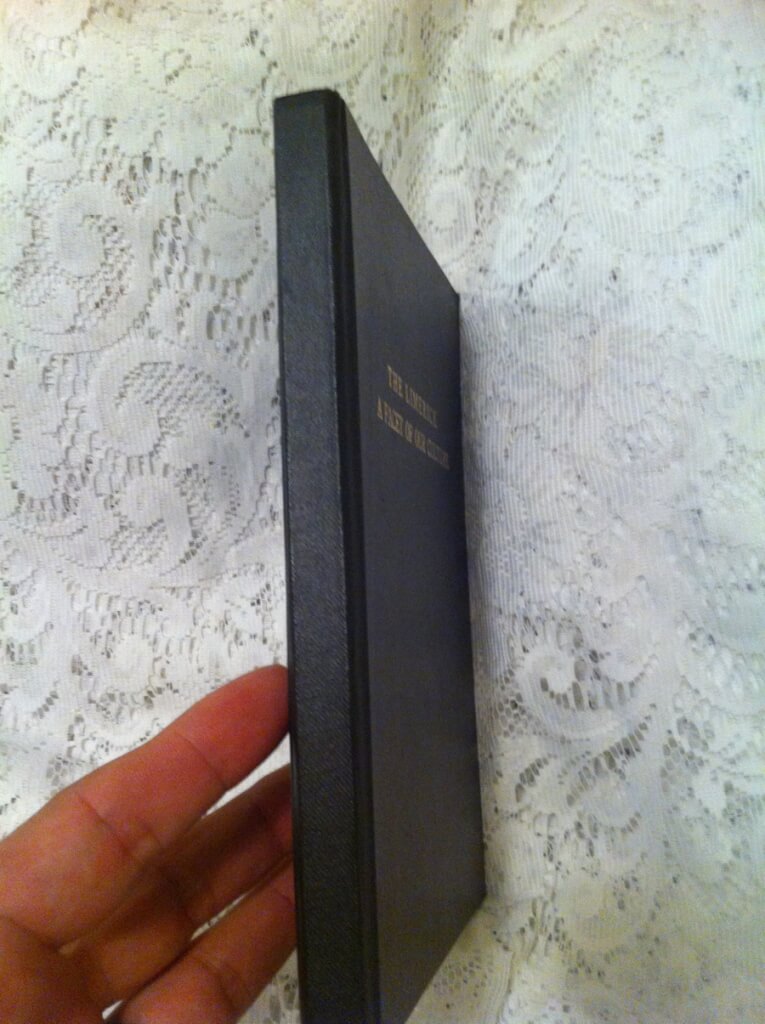
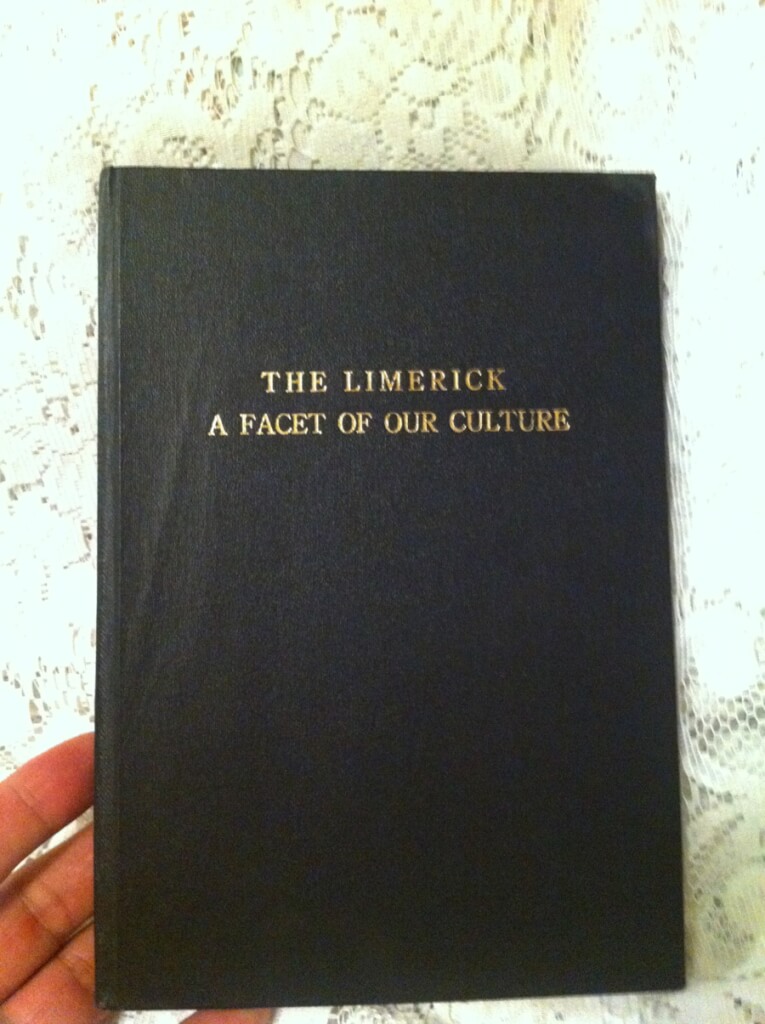 The Limerick, a facet of our culture, anonymous [A. Reynolds Morse] ( Cruciform Press, Mexico City: Privately Printed for Private Circulation to Subscribers Only, 1944 [Cleveland, Ohio: A. Reynolds Morse, 1948.] #208/250) 8" X 5.5", vii+157pp. Hardbound, black cloth boards, gilt lettering on cover. near fine condition (rare for this edition!), slight rust around staples. A. Reynolds Morse was an American, born in 1914, who died in 2000. He moved to Cleveland from Denver in 1941. An industrialist and philanthropist, he is best known for his activity in collecting works by Salvador Dali, and founding the Salvador Dali Museum. According to his obituary in the New York Times, Reynolds and his wife "embarked on a sometimes turbulent friendship with Dali and his wife, Gala". He also had a hobby of collecting and publishing works that other publishers would not print. Title page: "A study of the history and development of the limerick, ensplendor'd with over two hundred examples of the immortal verse form, commentaries, and index" This book is considered by most to be the "dirtiest" collection of limericks. Mr. Morse also published "Folk Poems and Ballads An Anthology". Both books were suppressed by police action in the late 1940's. This is a VERY rare near fine copy of this hard-to-find book. It was poorly made so most of the copies out there have signatures loose.
The Limerick, a facet of our culture, anonymous [A. Reynolds Morse] ( Cruciform Press, Mexico City: Privately Printed for Private Circulation to Subscribers Only, 1944 [Cleveland, Ohio: A. Reynolds Morse, 1948.] #208/250) 8" X 5.5", vii+157pp. Hardbound, black cloth boards, gilt lettering on cover. near fine condition (rare for this edition!), slight rust around staples. A. Reynolds Morse was an American, born in 1914, who died in 2000. He moved to Cleveland from Denver in 1941. An industrialist and philanthropist, he is best known for his activity in collecting works by Salvador Dali, and founding the Salvador Dali Museum. According to his obituary in the New York Times, Reynolds and his wife "embarked on a sometimes turbulent friendship with Dali and his wife, Gala". He also had a hobby of collecting and publishing works that other publishers would not print. Title page: "A study of the history and development of the limerick, ensplendor'd with over two hundred examples of the immortal verse form, commentaries, and index" This book is considered by most to be the "dirtiest" collection of limericks. Mr. Morse also published "Folk Poems and Ballads An Anthology". Both books were suppressed by police action in the late 1940's. This is a VERY rare near fine copy of this hard-to-find book. It was poorly made so most of the copies out there have signatures loose. -
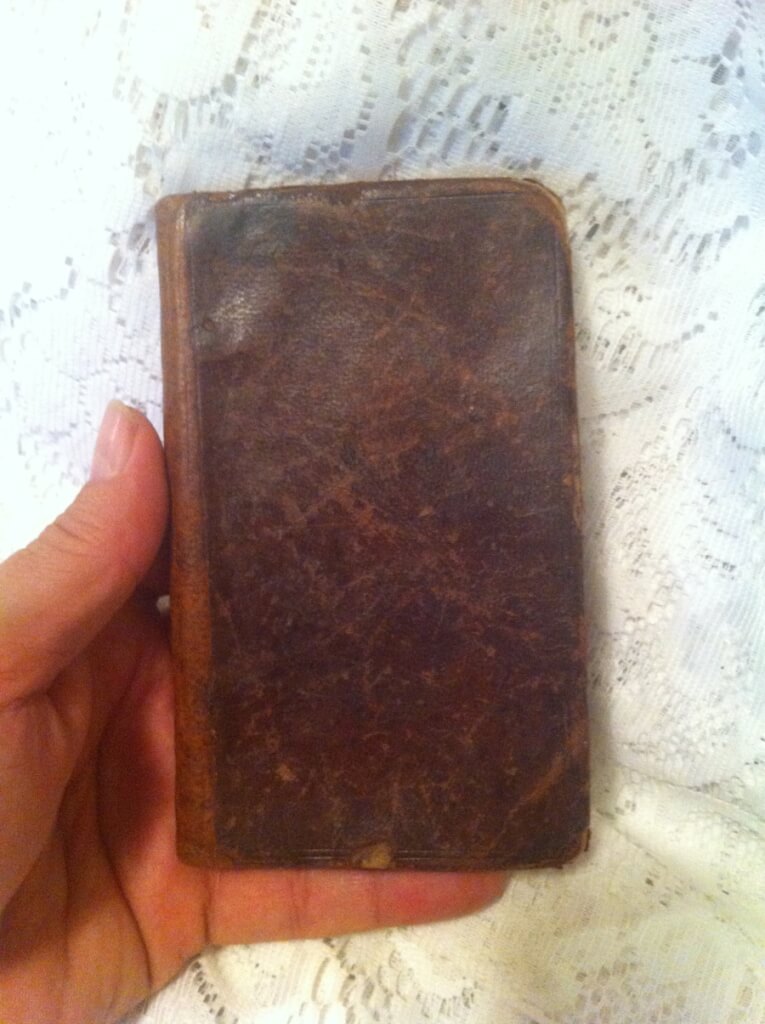
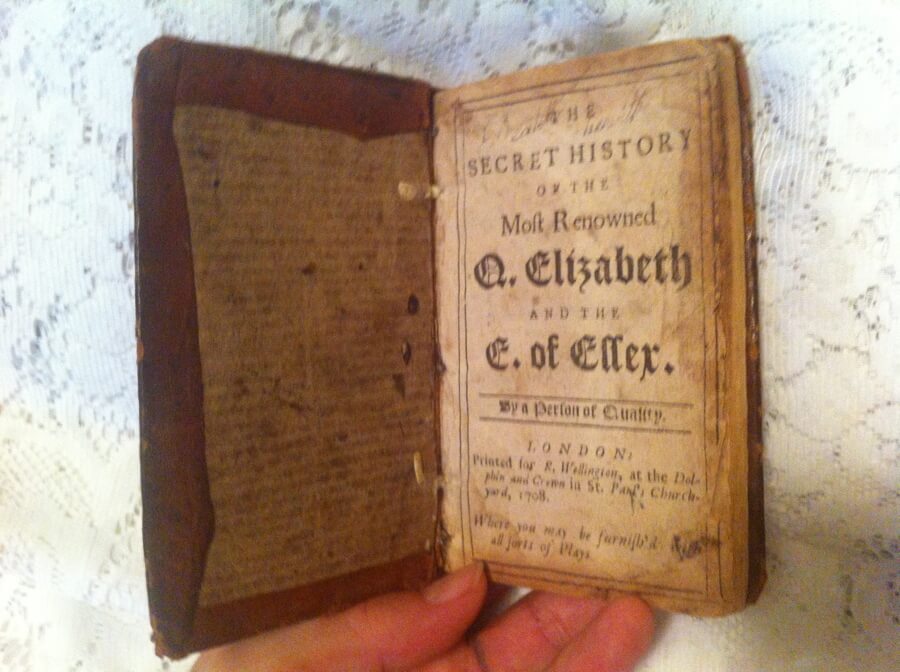 The secret history of the most renowned Q. Elizabeth and the E. of Essex, "By a Person of Quality", ("Printed for R. Wellington, at the Dolphin and Crown in St. Paul's Churchyard, 1708. Where you may be furnish'd with all sorts of Plays.") 3.25"x5.5", in two parts with separate title pages 1-62,63-112pp(of 115?), bound in brown leather, no front or rear endpapers, not illustrated, poor condition, binding and boards are solid but pages soiled and edges tattered, page 111/112 piece torn off, pages 113-155 missing, writing (alphabet letters) near and on part one title page. By the late seventeenth century, Elizabeth's love life became a subject of obsession in England and especially in France. This book is the most famous of the absurd tattle-tale books. It was a translation of Comte d'Essex histoire angloise first published in 1678 by Claude Barbin – a Parisian publisher who edited the works of Molière, La Fontaine, Charles Perrault and Corneille. The earliest translations to english date show up around 1680. Most of them have a false imprint of "Cologne : Printed for Will with the Wisp". Few are seen with this particular imprint. The story was turned into a play and in 1912 adapted as a silent film entitled Les Amours de la reine Élisabeth starring Sarah Bernhardt as Elizabeth.
The secret history of the most renowned Q. Elizabeth and the E. of Essex, "By a Person of Quality", ("Printed for R. Wellington, at the Dolphin and Crown in St. Paul's Churchyard, 1708. Where you may be furnish'd with all sorts of Plays.") 3.25"x5.5", in two parts with separate title pages 1-62,63-112pp(of 115?), bound in brown leather, no front or rear endpapers, not illustrated, poor condition, binding and boards are solid but pages soiled and edges tattered, page 111/112 piece torn off, pages 113-155 missing, writing (alphabet letters) near and on part one title page. By the late seventeenth century, Elizabeth's love life became a subject of obsession in England and especially in France. This book is the most famous of the absurd tattle-tale books. It was a translation of Comte d'Essex histoire angloise first published in 1678 by Claude Barbin – a Parisian publisher who edited the works of Molière, La Fontaine, Charles Perrault and Corneille. The earliest translations to english date show up around 1680. Most of them have a false imprint of "Cologne : Printed for Will with the Wisp". Few are seen with this particular imprint. The story was turned into a play and in 1912 adapted as a silent film entitled Les Amours de la reine Élisabeth starring Sarah Bernhardt as Elizabeth. -
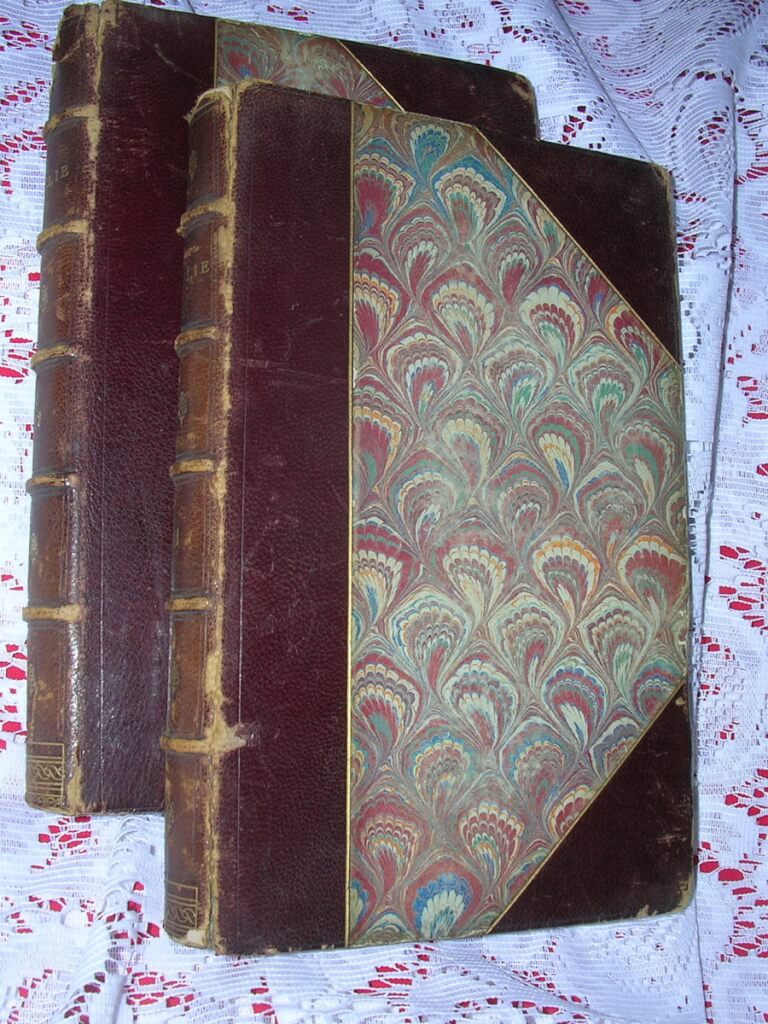
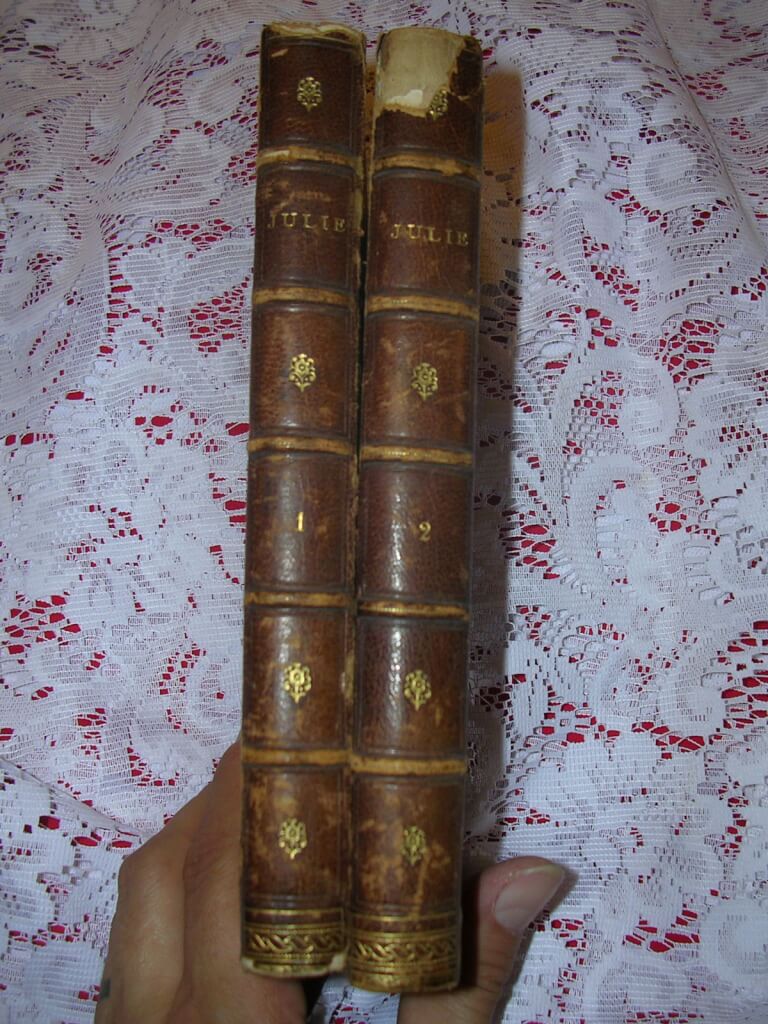 Julie, ou J'ai sauvé ma rose, Madame de C*** [Félicité Choiseul-Meuse] (Gay et Doucé, Bruxelles, 1882) 7.5" x 4.75", 2 vol. 169pp 188pp, hardbound half-leather over decorated paper boards and marbled endpapers. Gilt lettering and decorations on spine, 5 raised bands. 2 frontispiece engravings. Fair condition for age. Vol. 1 front boards loose and first few endpapers not attached, no missing pages, wear and tear to top of spine. Edges worn, corners bumped. Felicite de Choiseul-Meuse wrote approximately twenty-seven novels from 1797 to 1824. Writings are sometimes identified by pseudonyms and acronyms: LFDLC; Emilia P ***, Madame de C *** , etc.. Her 1807 novel "Julie, ou j'ai sauvé ma rose" [Julie, or I saved my rose] is widely considered the first erotic novel written by a woman. It is more appropriately translated as "how I kept my cherry" for it tells the tale of a young woman who lets her lovers fondle her all they want, but will not allow penetration until she finds the right man and marries him. The work was condemned as obscene and its destruction ordered by the Cour royale de Paris on August 5, 1828. Excerpt: "I tasted in his arms unspeakable pleasures. Deadened by pleasure, then revived by an even more delirious pleasure, I made the object of happiness almost as happy as I was myself; and yet, true to my system, I made sure that he did not harvest the rose."
Julie, ou J'ai sauvé ma rose, Madame de C*** [Félicité Choiseul-Meuse] (Gay et Doucé, Bruxelles, 1882) 7.5" x 4.75", 2 vol. 169pp 188pp, hardbound half-leather over decorated paper boards and marbled endpapers. Gilt lettering and decorations on spine, 5 raised bands. 2 frontispiece engravings. Fair condition for age. Vol. 1 front boards loose and first few endpapers not attached, no missing pages, wear and tear to top of spine. Edges worn, corners bumped. Felicite de Choiseul-Meuse wrote approximately twenty-seven novels from 1797 to 1824. Writings are sometimes identified by pseudonyms and acronyms: LFDLC; Emilia P ***, Madame de C *** , etc.. Her 1807 novel "Julie, ou j'ai sauvé ma rose" [Julie, or I saved my rose] is widely considered the first erotic novel written by a woman. It is more appropriately translated as "how I kept my cherry" for it tells the tale of a young woman who lets her lovers fondle her all they want, but will not allow penetration until she finds the right man and marries him. The work was condemned as obscene and its destruction ordered by the Cour royale de Paris on August 5, 1828. Excerpt: "I tasted in his arms unspeakable pleasures. Deadened by pleasure, then revived by an even more delirious pleasure, I made the object of happiness almost as happy as I was myself; and yet, true to my system, I made sure that he did not harvest the rose." -
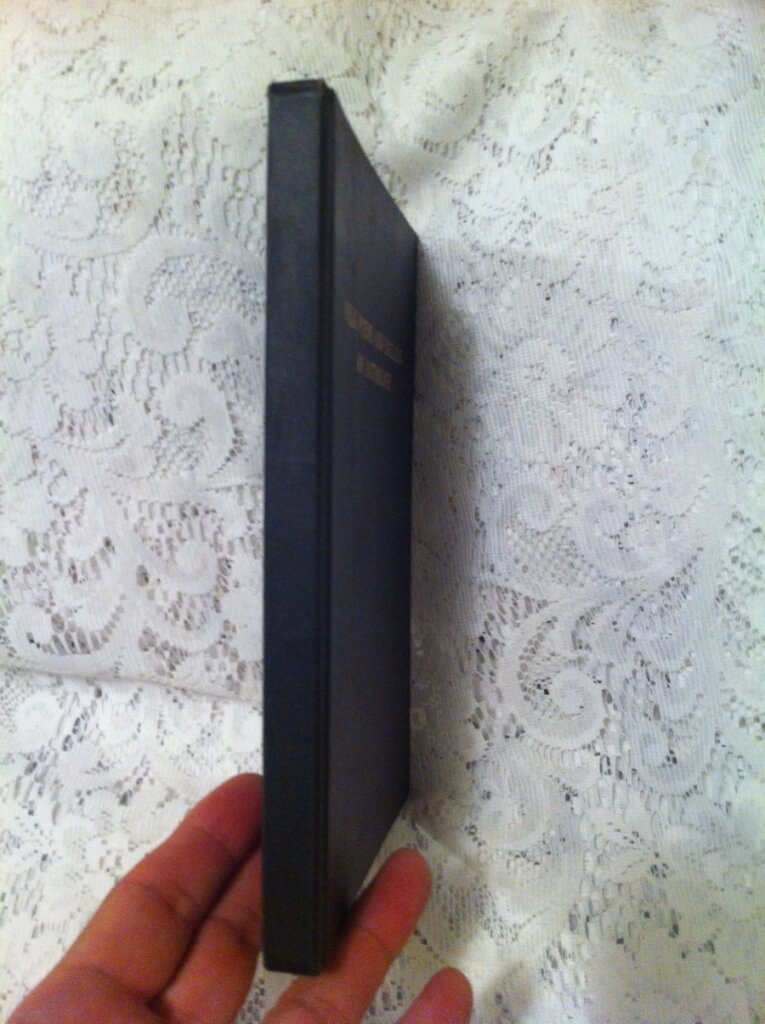
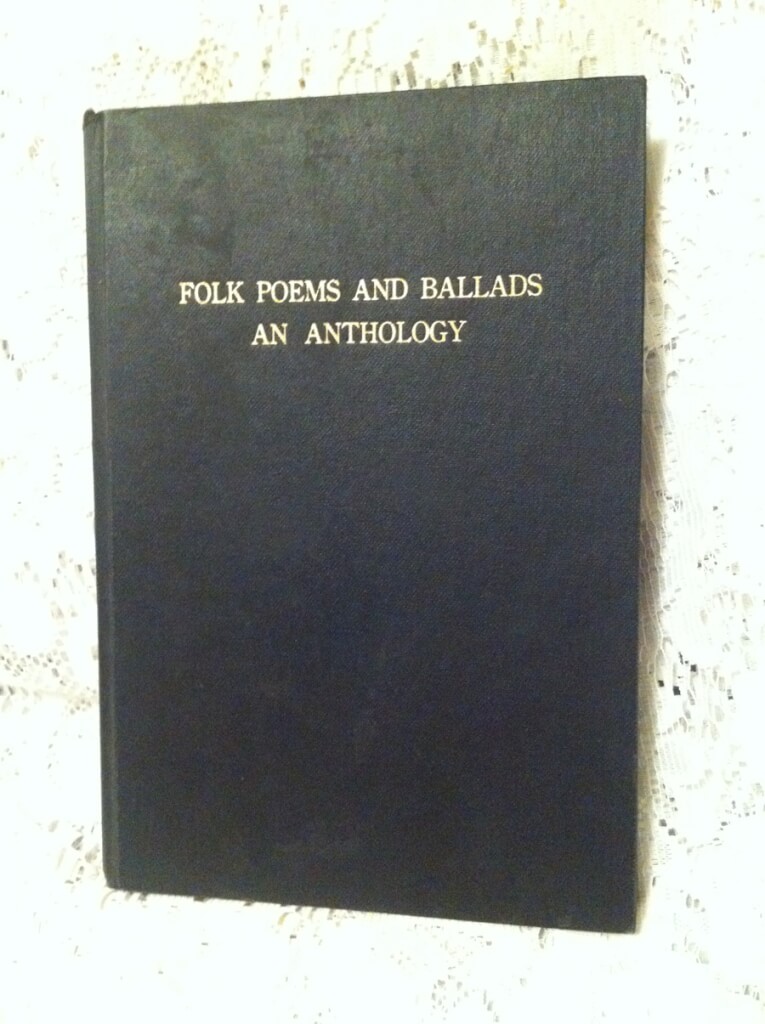 Folk Poems and Ballads An Anthology, anonymous [A. Reynolds Morse] ( Cruciform Press, Mexico City: Privately Printed for Private Circulation to Subscribers Only, 1944 [Cleveland, Ohio: A. Reynolds Morse, 1948.] #230/250) 8" X 5.5", vi 128pp. Hardbound, black cloth boards, gilt lettering on cover. Fair condition, 1st signature detached, 4th signature loose but holding (a common problem with these books), good copy of a poorly made book. Subtitled: "A collection of rare verses and amusing folk songs compiled from scarce and suppressed books as well as from verbal sources which modern prudery, false social customs, and intolerance laws have separated from the public and historical record." A. Reynolds Morse was an American, born in 1914, who died in 2000. He moved to Cleveland from Denver in 1941. An industrialist and philanthropist, he is best known for his activity in collecting works by Salvador Dali, and founding the Salvador Dali Museum. According to his obituary in the New York Times, Reynolds and his wife "embarked on a sometimes turbulent friendship with Dali and his wife, Gala". He also had a hobby of collecting and publishing works that other publishers would not print. Title page: "A collection of rare verses and amusing folk songs compiled from scarce and suppressed books as well as from verbal sources which modern prudery, false social customs, and intolerance have separated from the public and historical record." Mr. Morse also published "Limericks, A Facet of Our Culture". Both books were suppressed by police action in the late 1940's. This is the more rare of the two books.
Folk Poems and Ballads An Anthology, anonymous [A. Reynolds Morse] ( Cruciform Press, Mexico City: Privately Printed for Private Circulation to Subscribers Only, 1944 [Cleveland, Ohio: A. Reynolds Morse, 1948.] #230/250) 8" X 5.5", vi 128pp. Hardbound, black cloth boards, gilt lettering on cover. Fair condition, 1st signature detached, 4th signature loose but holding (a common problem with these books), good copy of a poorly made book. Subtitled: "A collection of rare verses and amusing folk songs compiled from scarce and suppressed books as well as from verbal sources which modern prudery, false social customs, and intolerance laws have separated from the public and historical record." A. Reynolds Morse was an American, born in 1914, who died in 2000. He moved to Cleveland from Denver in 1941. An industrialist and philanthropist, he is best known for his activity in collecting works by Salvador Dali, and founding the Salvador Dali Museum. According to his obituary in the New York Times, Reynolds and his wife "embarked on a sometimes turbulent friendship with Dali and his wife, Gala". He also had a hobby of collecting and publishing works that other publishers would not print. Title page: "A collection of rare verses and amusing folk songs compiled from scarce and suppressed books as well as from verbal sources which modern prudery, false social customs, and intolerance have separated from the public and historical record." Mr. Morse also published "Limericks, A Facet of Our Culture". Both books were suppressed by police action in the late 1940's. This is the more rare of the two books. -
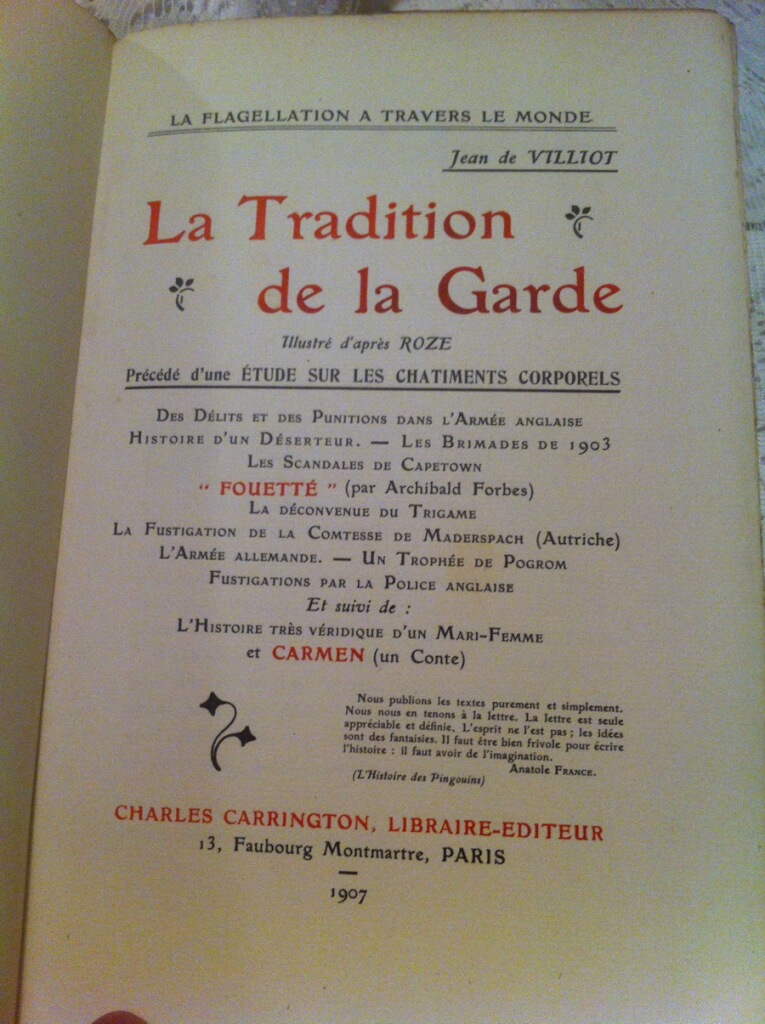
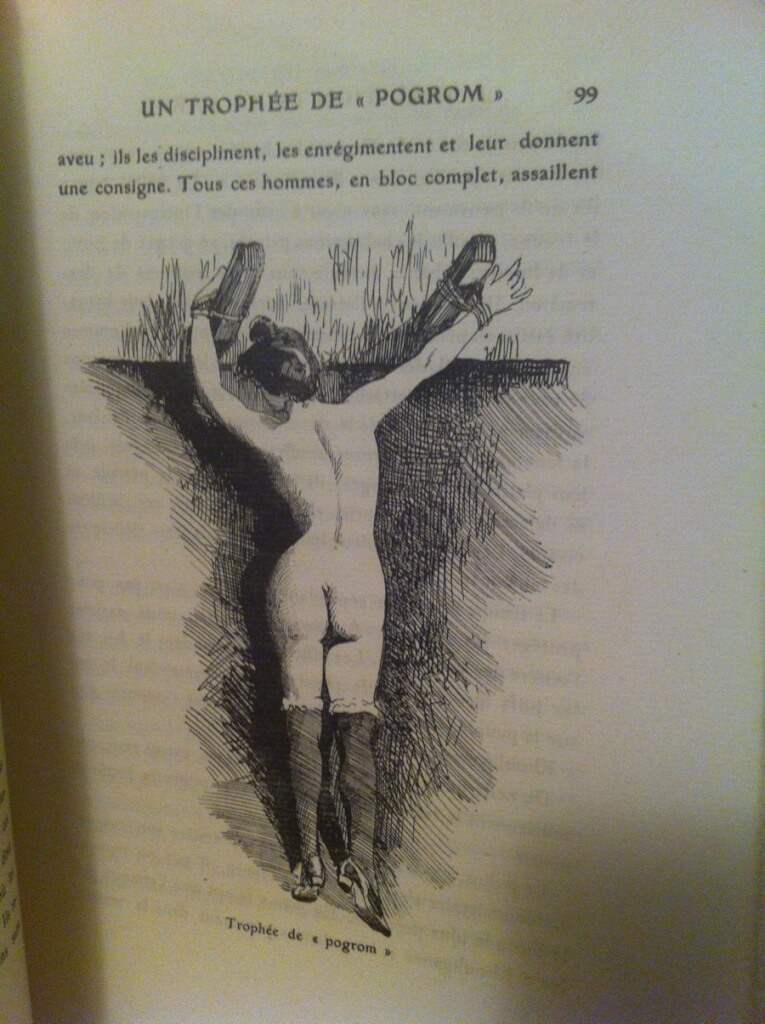 La Tradition de la Garde. Illustré d'après Roze. Précédé d'une étude sur les chatiments corporels. [Tradition of the Guard. Illustrated by Roze. Preceded by a study on corporal punishment.] by Jean de Villiot, [pseud. Georges Grassal de Choffat or Hugues Rebell], illus. Léon Roze (Charles Carrington, Paris, 1907, #244/700) 7.75" x 9.75", 209pp, very good condition for age, some light stains, soft covers and binding good, a rare, numerous illustrations
La Tradition de la Garde. Illustré d'après Roze. Précédé d'une étude sur les chatiments corporels. [Tradition of the Guard. Illustrated by Roze. Preceded by a study on corporal punishment.] by Jean de Villiot, [pseud. Georges Grassal de Choffat or Hugues Rebell], illus. Léon Roze (Charles Carrington, Paris, 1907, #244/700) 7.75" x 9.75", 209pp, very good condition for age, some light stains, soft covers and binding good, a rare, numerous illustrations -
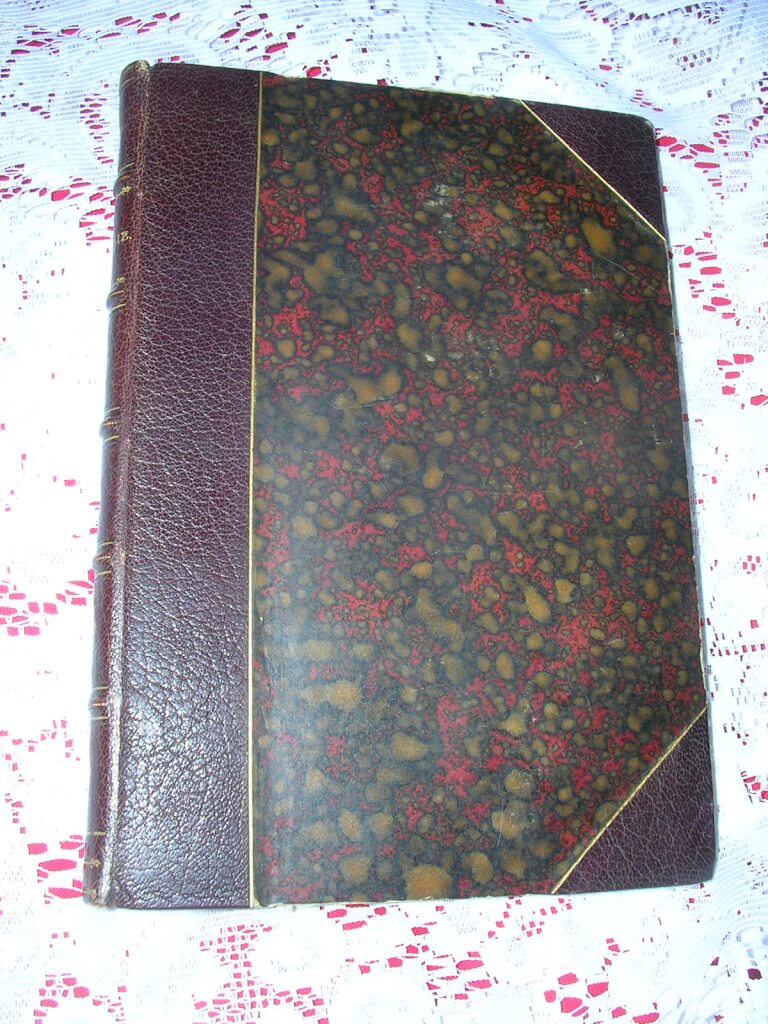
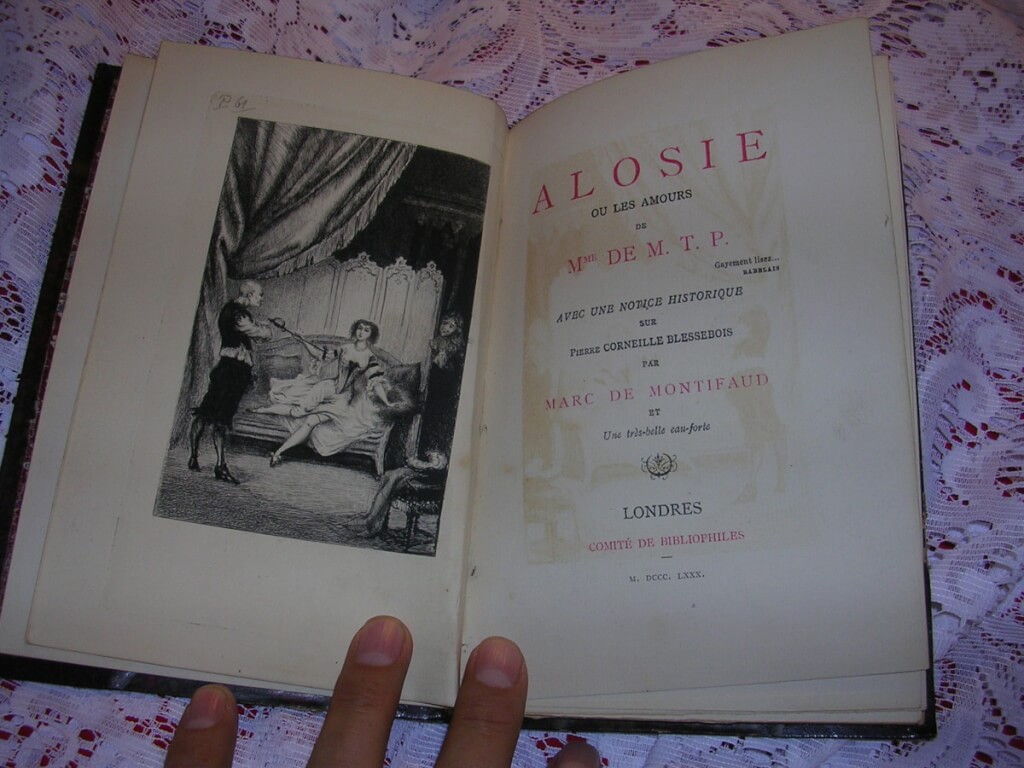 Alosie, ou Les Amours de Mme. de M. T. P. | Avec une notice historique sur Pierre Corneille Blessebois par Marc de Montifaud et Une très-belle eau-forte, Marc de Montifaud [pseud. Marie-Amélie Chartroule, Mme Quivogne de Montifaud] (Comité de Bibliophiles, London, 1880 [131/500 printed on Holland paper]) 7.5" x 5.25", 104pp, hardbound 1/2 leather, marbled boards and endpapers, gilt decorationson spine and leather corners, five raised bands on spine. Top edge gilt. Frontispiece engraving. #131 of 300 on Holland paper. Great condition for age. Initials "P.G." above frontispiece. Mme Quivogne de Montifaud (1845-50 to 1912/13) french writer and "free-thinker". She often dressed as her male pseudonym Marc de Montifaud. This book (published in London in 1880) is a reprint of part of the larger 17th century erotic work, "Amours des dames illustres de nostre siècle" (Loves of Illustrious Ladies of our Century) with an essay where Montifaud tries to unravel the authorship (usually the work is attributed to Pierre Corneille Blessebois). The author changes the original name to reflect that this is an autobiography of Madame de Montespan, the notorius mistress of Louis XIV. When originally published in Holland in 1878 (as "Lupanie, histoire amoureuse de ce temps") a court in Seine called it a moral outrage describing "licentious scenes on almost every page; told in a style revoltingly obscene". For publishing this book Montifaud was sentenced to 8 days in jail and fined 500 francs and ordered all copies of the book destroyed. The publisher was also fined 500 francs. This is a rare copy of a rare book in it's original "publishers leather".
Alosie, ou Les Amours de Mme. de M. T. P. | Avec une notice historique sur Pierre Corneille Blessebois par Marc de Montifaud et Une très-belle eau-forte, Marc de Montifaud [pseud. Marie-Amélie Chartroule, Mme Quivogne de Montifaud] (Comité de Bibliophiles, London, 1880 [131/500 printed on Holland paper]) 7.5" x 5.25", 104pp, hardbound 1/2 leather, marbled boards and endpapers, gilt decorationson spine and leather corners, five raised bands on spine. Top edge gilt. Frontispiece engraving. #131 of 300 on Holland paper. Great condition for age. Initials "P.G." above frontispiece. Mme Quivogne de Montifaud (1845-50 to 1912/13) french writer and "free-thinker". She often dressed as her male pseudonym Marc de Montifaud. This book (published in London in 1880) is a reprint of part of the larger 17th century erotic work, "Amours des dames illustres de nostre siècle" (Loves of Illustrious Ladies of our Century) with an essay where Montifaud tries to unravel the authorship (usually the work is attributed to Pierre Corneille Blessebois). The author changes the original name to reflect that this is an autobiography of Madame de Montespan, the notorius mistress of Louis XIV. When originally published in Holland in 1878 (as "Lupanie, histoire amoureuse de ce temps") a court in Seine called it a moral outrage describing "licentious scenes on almost every page; told in a style revoltingly obscene". For publishing this book Montifaud was sentenced to 8 days in jail and fined 500 francs and ordered all copies of the book destroyed. The publisher was also fined 500 francs. This is a rare copy of a rare book in it's original "publishers leather". -
 Your Sex Life | Before Marriage, Bob Hoffman (Strength & Health Publishing Co.,York, PA, 1939, first edition, third printing) 7.75" X 5.75", 206pp, hard bound blue cloth, just good condition, rubbing to boards, internal pages yellowing but good. Robert Collins Hoffman (1898 - 1985) was an American entrepreneur who rose to prominence as the owner of York Barbell. He founded magazines such as Muscular Development and Strength & Health, and was the manufacturer of a line of bodybuilding supplements. Hoffman promoted bodybuilders like John Grimek and Sigmund Klein, coached the American Olympic Weightlifting Team between 1936 and 1968, and was a founding member of the President's Council on Physical Fitness and Sports. This is a very rare copy of Hoffman book about premarital sex.
Your Sex Life | Before Marriage, Bob Hoffman (Strength & Health Publishing Co.,York, PA, 1939, first edition, third printing) 7.75" X 5.75", 206pp, hard bound blue cloth, just good condition, rubbing to boards, internal pages yellowing but good. Robert Collins Hoffman (1898 - 1985) was an American entrepreneur who rose to prominence as the owner of York Barbell. He founded magazines such as Muscular Development and Strength & Health, and was the manufacturer of a line of bodybuilding supplements. Hoffman promoted bodybuilders like John Grimek and Sigmund Klein, coached the American Olympic Weightlifting Team between 1936 and 1968, and was a founding member of the President's Council on Physical Fitness and Sports. This is a very rare copy of Hoffman book about premarital sex. -
 Julie, ou J'ai sauvé ma rose, Madame de C*** [Félicité Choiseul-Meuse] (Se trouve chez tous les Libraires Anglais, 1882) 8" x 5.25", 2 vol. bound together, 166pp 183pp, half calf on marbled boards, original wraps bound within, red label with gilt titles on spine, just good condition, boards intact, binding good, ribbon intact, major scuffing and bumping to the spine and rubbing to the boards. Felicite de Choiseul-Meuse wrote approximately twenty-seven novels from 1797 to 1824. Writings are sometimes identified by pseudonyms and acronyms: LFDLC; Emilia P ***, Madame de C *** , etc.. Her 1807 novel "Julie, ou j'ai sauvé ma rose" [Julie, or I saved my rose] is widely considered the first erotic novel written by a woman. It is more appropriately translated as "how I kept my cherry" for it tells the tale of a young woman who lets her lovers fondle her all they want, but will not allow penetration until she finds the right man and marries him. The work was condemned as obscene and its destruction ordered by the Cour royale de Paris on August 5, 1828. Excerpt: "I tasted in his arms unspeakable pleasures. Deadened by pleasure, then revived by an even more delirious pleasure, I made the object of happiness almost as happy as I was myself; and yet, true to my system, I made sure that he did not harvest the rose."
Julie, ou J'ai sauvé ma rose, Madame de C*** [Félicité Choiseul-Meuse] (Se trouve chez tous les Libraires Anglais, 1882) 8" x 5.25", 2 vol. bound together, 166pp 183pp, half calf on marbled boards, original wraps bound within, red label with gilt titles on spine, just good condition, boards intact, binding good, ribbon intact, major scuffing and bumping to the spine and rubbing to the boards. Felicite de Choiseul-Meuse wrote approximately twenty-seven novels from 1797 to 1824. Writings are sometimes identified by pseudonyms and acronyms: LFDLC; Emilia P ***, Madame de C *** , etc.. Her 1807 novel "Julie, ou j'ai sauvé ma rose" [Julie, or I saved my rose] is widely considered the first erotic novel written by a woman. It is more appropriately translated as "how I kept my cherry" for it tells the tale of a young woman who lets her lovers fondle her all they want, but will not allow penetration until she finds the right man and marries him. The work was condemned as obscene and its destruction ordered by the Cour royale de Paris on August 5, 1828. Excerpt: "I tasted in his arms unspeakable pleasures. Deadened by pleasure, then revived by an even more delirious pleasure, I made the object of happiness almost as happy as I was myself; and yet, true to my system, I made sure that he did not harvest the rose." -
 Julie, ou J'ai sauvé ma rose, Madame de C*** [Félicité Choiseul-Meuse] (J.-J. Gay, Bruxelles, 1882) 8" x 5.25", 2 vol. 169pp 188pp, full mottled calf, marbled endpapers. Gilt lettering and decorations on spine, 5 raised bands. 2 frontispiece engravings. just Fair condition, interior good, exterior in poor shape, Vol. 1 boards loose, Vol. 2 boards detached. Felicite de Choiseul-Meuse wrote approximately twenty-seven novels from 1797 to 1824. Writings are sometimes identified by pseudonyms and acronyms: LFDLC; Emilia P ***, Madame de C *** , etc.. Her 1807 novel "Julie, ou j'ai sauvé ma rose" [Julie, or I saved my rose] is widely considered the first erotic novel written by a woman. It is more appropriately translated as "how I kept my cherry" for it tells the tale of a young woman who lets her lovers fondle her all they want, but will not allow penetration until she finds the right man and marries him. The work was condemned as obscene and its destruction ordered by the Cour royale de Paris on August 5, 1828. Excerpt: "I tasted in his arms unspeakable pleasures. Deadened by pleasure, then revived by an even more delirious pleasure, I made the object of happiness almost as happy as I was myself; and yet, true to my system, I made sure that he did not harvest the rose."
Julie, ou J'ai sauvé ma rose, Madame de C*** [Félicité Choiseul-Meuse] (J.-J. Gay, Bruxelles, 1882) 8" x 5.25", 2 vol. 169pp 188pp, full mottled calf, marbled endpapers. Gilt lettering and decorations on spine, 5 raised bands. 2 frontispiece engravings. just Fair condition, interior good, exterior in poor shape, Vol. 1 boards loose, Vol. 2 boards detached. Felicite de Choiseul-Meuse wrote approximately twenty-seven novels from 1797 to 1824. Writings are sometimes identified by pseudonyms and acronyms: LFDLC; Emilia P ***, Madame de C *** , etc.. Her 1807 novel "Julie, ou j'ai sauvé ma rose" [Julie, or I saved my rose] is widely considered the first erotic novel written by a woman. It is more appropriately translated as "how I kept my cherry" for it tells the tale of a young woman who lets her lovers fondle her all they want, but will not allow penetration until she finds the right man and marries him. The work was condemned as obscene and its destruction ordered by the Cour royale de Paris on August 5, 1828. Excerpt: "I tasted in his arms unspeakable pleasures. Deadened by pleasure, then revived by an even more delirious pleasure, I made the object of happiness almost as happy as I was myself; and yet, true to my system, I made sure that he did not harvest the rose."
